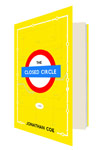In the closing pages of Jonathan Coe’s The Rotters’ Club (2001), which spans 1973 to 1979 among schoolmates in the English Midlands, a character makes the confident assertion that “that woman”—Margaret Thatcher, not Miss Lewinsky—“will never be Prime Minister of this country.” And she never is, at least not between the covers of The Closed Circle. Part two of Coe’s Birmingham ensemble diptych begins in 1999, skipping over the ascendancy and desiccation of iron-fisted Thatcherism—as well as the first two halcyon years of “New Labour” under Tony Blair—and the lacuna is like a repressed memory of trauma.
Two decades on, the erstwhile bright young things of King William’s School have clearly absorbed their share of shocks, but the damp accretion of diminished expectations and middle-aged stagnancy have exacted more of a toll. Benjamin Trotter—the brilliant one—is at first a writer and composer who happens to work in an accountant’s office, but all too soon he’s an accountant who occasionally writes and composes. Doug Anderton—working-class scholarship student and son of a union man—is now a columnist for a Times-like broadsheet and married into a posh set that breeds children with names like Coriander and Emerald. Benjamin’s little brother, Paul—whom Doug estimated in their school days as “a creepy little right-wing shit”—grows into a creepy little New Labour shit, a dim yet ambitious MP. Onetime school-paper columnist Claire Newman returns home from a few years’ sabbatical in Italy to a country where, suddenly, everyone is on the phone and everyone is smoldering with free-floating anger.
Post-Blair, Claire muses, the nation has become more apathetic, but “if you scratch the surface of that apathy, I think what you find underneath is something else altogether—a terrible, seething frustration.” One might wish that Coe had gone about diagnosing the causes and symptoms of that repressed rage—spend a couple of years in Britain and you’ll sense it too—because it seems a crucial emotional component to his social-historical project in The Rotters’ Club and The Closed Circle. Coe bemoans the collapse of any vestige of civic solidarity in the new gilded age as forcefully as the Australian Elliot Perlman or the American Thomas Frank, and deploys Doug Anderton as a lone voice of protest at the euthanasia of Old Labour by New: “The left’s moved way over to the right, the right’s moved a tiny bit to the left, the circle’s...
You have reached your article limit
Sign up for a digital subscription and continue reading all new issues, plus our entire archives, for just $1.50/month.
Already a subscriber? Sign in





